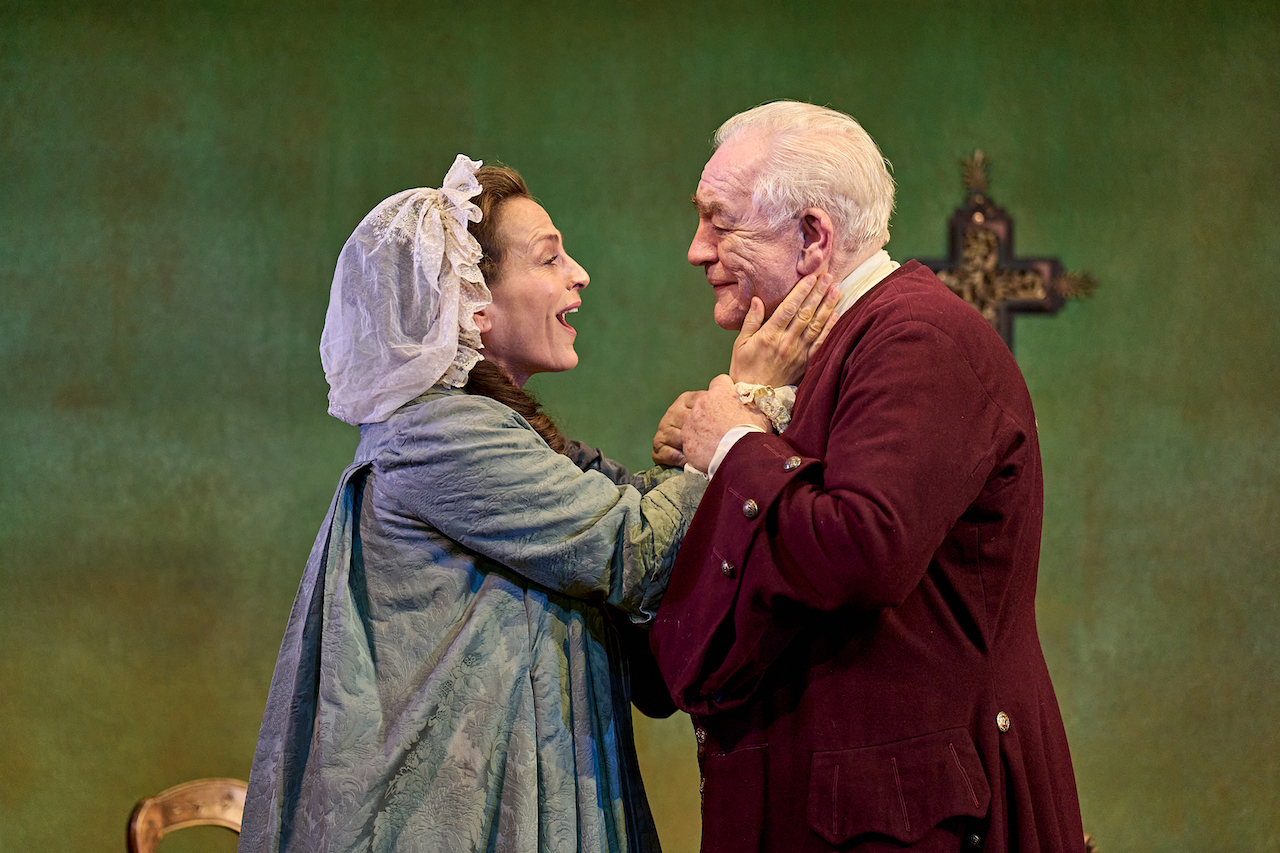
The Score is a fine example of meat-and-potatoes theatre. Simple plotting, big characters, terrific speeches and a happy ending. The protagonist, J.S. Bach, receives a mysterious summons from Frederick the Great of Prussia. The long first act takes us through Bach’s professional woes and his physical infirmities. His weak vision is being treated by an English oculist, John Taylor, who tours Europe in a scarlet coach decorated with eyes. For unexplained reasons, Taylor decides to taste Bach’s urine, which is excessively sugary – a symptom of diabetes. When Bach reaches Frederick’s court in Potsdam he finds the atmosphere oppressive and alienating. Enter Voltaire. ‘Prussia is not a state in possession of an army,’ he says in a comedy French accent. ‘It is an army in possession of a state.’
Bach doesn’t realise that Frederick’s invitation is a trick. With a gang of scheming musicians, Frederick has devised an intractable sequence of notes which he asks Bach to turn into a three-part fugue at the keyboard. Bach, being a genius, wins the wager easily but the dramatic arrangement of the challenge is very craftily handled with plenty of surprises to keep you guessing. After winning the jackpot, Bach gives it away to a deserving cause. He then rounds on Frederick in front of the entire court and attacks Prussia’s foreign policy. He cites numerous abuses inflicted by Frederick’s drunken soldiers and he demands reparations for their offences. Plenty of topical echoes to enjoy here. The chastened Frederick agrees to ‘look into’ the atrocities but he stops short of promising actual cash.
This political scene is followed by lengthy metaphysical conversation as Bach and Frederick discuss military ethics, the nature of faith and the capacity of music to transcend everyday experience. A good editor might have cut much of this meandering chitchat. Never mind. The redoubtable Brian Cox plays Bach as a petulant but soft-hearted crosspatch. If you didn’t know he was a great composer, you might have mistaken him for an uppity pensioner at an anti-Brexit rally. Stephen Hagan, as Frederick, is a joy to watch. Amusing, debonair and charismatic, he conceals his insincerity beneath an abundance of vigour and charm. Hagan’s model, clearly, is David Cameron. Peter de Jersey enjoys himself as Voltaire in a wig and a toothy smirk. The show is flimsy in parts. The loss of 20 minutes would greatly strengthen its sinews. But at press night, the crowd loved it. Broadway next? Absolutely.
At press night, the crowd loved it. Broadway next? Absolutely
Alterations at the National Theatre is a drama about the rag trade set in the 1970s. Visually, it’s great to watch. All the characters dress like Marc Bolan in flared trousers, garish shirts and platform shoes. The main character, Walker, is a spirited young tailor who hires an attic in Clapham and dreams of growing rich by doing odd jobs for high-street retailers. Unfortunately, Walker has the IQ of a doorbell but he’s very hardworking and his hopes for the future are limitless. He thinks he can conquer the world with a sewing box. His problem is that he hires the wrong staff. His colleague, Buster, is so dim he can barely speak. His useless trainee, Courtney, spends too much moaning about his personal problems. His wife, Darlene, is a screechy nuisance who keeps barging into the workshop to tell everyone how hopeless she feels. And his chief assistant, Horace, is an overdressed twerp who can barely thread a needle.
Walker’s attic feels like a dramatic device rather than a genuine business. The characters are always dropping in to carp and gossip about nothing, or to deliver soundbites that belong in an oral history book. Walker tells us that ‘ABC’ is a less catchy name for a chain of cinemas than ‘Metropole’. Well, maybe it is. Another character analyses Britain’s economic woes. ‘Kids need to get off the street and find work,’ Fair enough. That’s the 1970s solved. And all of them are maddeningly good-natured and pleasant to each other.
To call this show a play would be inaccurate. It feels like a sociology lecture
The main storyline involves a two-way tussle over the affections of Darlene but there’s no intensity or passion about this battle. A play without conflict is like a harp without strings. After 120 minutes of aimless guff, the show finally delivers a moment of truth. A wrestling match breaks out between two men in flared trousers who scream their heads off while swinging their limp little fists at each other. It’s like watching the Village People fighting backstage over a leather cap. To call this show a play would be inaccurate. It feels like a sociology lecture transformed into a piece of theatre by a charity that creates work for jobless actors. The company of 11 includes five thesps with non-speaking roles. They’ve been hired as dummies to add atmosphere. What staggering profligacy.








Comments